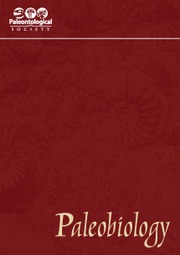Crossref Citations
This article has been cited by the following publications. This list is generated based on data provided by
Crossref.
Gould, Stephen Jay
1984.
The life and work of T. J. M. Schopf (1939–1984).
Paleobiology,
Vol. 10,
Issue. 2,
p.
280.
Potts, D. C.
1984.
Generation times and the Quaternary evolution of reef-building corals.
Paleobiology,
Vol. 10,
Issue. 1,
p.
48.
Sepkoski, J. John
1984.
A kinetic model of Phanerozoic taxonomic diversity. III. Post-Paleozoic families and mass extinctions.
Paleobiology,
Vol. 10,
Issue. 2,
p.
246.
BARNWELL, F. H.
and
THURMAN, C. L.
1984.
Taxonomy and biogeography of the fiddler crabs (Ocypodidae: Genus Uca) of the Atlantic and Gulf coasts of eastern North America.
Zoological Journal of the Linnean Society,
Vol. 81,
Issue. 1,
p.
23.
Raffi, Sergio
Stanley, Steven M.
and
Marasti, Raffaella
1985.
Biogeographic patterns and Plio-Pleistocene extinction of Bivalvia in the Mediterranean and southern North Sea.
Paleobiology,
Vol. 11,
Issue. 4,
p.
368.
Jablonski, David
Flessa, Karl W.
and
Valentine, James W.
1985.
Biogeography and paleobiology.
Paleobiology,
Vol. 11,
Issue. 1,
p.
75.
Crame, J. A.
1986.
Late Pleistocene molluscan assemblages from the coral reefs of the Kenya coast.
Coral Reefs,
Vol. 4,
Issue. 3,
p.
183.
Westrop, Stephen R.
and
Ludvigsen, Rolf
1987.
Biogeographic control of trilobite mass extinction at an Upper Cambrian “biomere” boundary.
Paleobiology,
Vol. 13,
Issue. 1,
p.
84.
ECKERT, JAMES D.
1988.
Late Ordovician extinction of North American and British crinoids.
Lethaia,
Vol. 21,
Issue. 2,
p.
147.
Eckert, James D.
1988.
Late Ordovician extinction of North American and British crinoids.
Lethaia,
Vol. 21,
Issue. 2,
p.
147.
1989.
The case for sea-level change as a dominant causal factor in mass extinction of marine invertebrates.
Philosophical Transactions of the Royal Society of London. B, Biological Sciences,
Vol. 325,
Issue. 1228,
p.
437.
Paulay, Gustav
1990.
Effects of late Cenozoic sea-level fluctuations on the bivalve faunas of tropical oceanic islands.
Paleobiology,
Vol. 16,
Issue. 4,
p.
415.
Coles, Graham
1990.
Ostracoda and Global Events.
p.
71.
Valentine, James W.
and
Jablonski, David
1991.
Biotic effects of sea level change: The Pleistocene test.
Journal of Geophysical Research: Solid Earth,
Vol. 96,
Issue. B4,
p.
6873.
Vermeij, Geerat J.
1995.
Economics, volcanoes, and Phanerozoic revolutions.
Paleobiology,
Vol. 21,
Issue. 2,
p.
125.
Rampino, Michael R.
1995.
Future climates of the world: a modelling perspective.
Vol. 16,
Issue. ,
p.
95.
Hoberg, Eric P.
1995.
Historical biogeography and modes of speciation across high-latitude seas of the Holarctic: concepts for host – parasite coevolution among the Phocini (Phocidae) and Tetrabothriidae (Eucestoda).
Canadian Journal of Zoology,
Vol. 73,
Issue. 1,
p.
45.
Erwin, D. H.
1995.
The Permian of Northern Pangea.
p.
20.
Morris, Paul J.
1996.
Testing patterns and causes of faunal stability in the fossil record, with an example from the Pliocene Lusso Beds of Zaire.
Palaeogeography, Palaeoclimatology, Palaeoecology,
Vol. 127,
Issue. 1-4,
p.
313.
Cintra-Buenrostro, Carlos E
Foster, M.S
and
Meldahl, K.H
2002.
Response of nearshore marine assemblages to global change: a comparison of molluscan assemblages in Pleistocene and modern rhodolith beds in the southwestern Gulf of California, México.
Palaeogeography, Palaeoclimatology, Palaeoecology,
Vol. 183,
Issue. 3-4,
p.
299.


